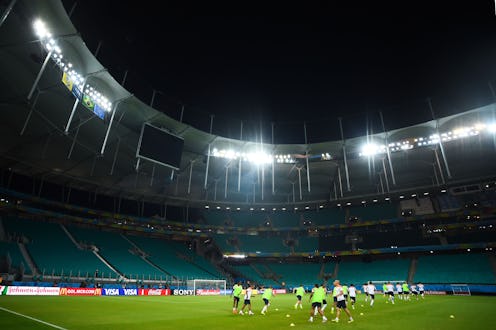News
America Might Have To Host The 2022 World Cup
Brazil's World Cup has barely started, and everybody's already turned against the 2022 World Cup. Qatar, which in 2010 won the bid to host the Cup, has been embroiled in claims that it won votes through bribery, not to mention the fact that it's just way, way too hot to play football in Qatar (122 degrees Fahrenheit, if you wondered). Now, it looks like the America may need to step in to host the 2022 World Cup.
ESPN reporter Jorge Ramos fed the World Cup rumor mill yesterday with a since-deleted Tweet that, if (when) Qatar is stripped of the bid, the U.S. has been approached to take on the duties. Sunil Gulati, the president of the United States Soccer Federation, has flatly denied Ramos' report.
If Qatar loses the bid, there would likely be a re-vote, which would throw original bidders Australia, South Korea, Japan, and the U.S. back into the pot. South Korea and Japan co-hosted the first Asian World Cup in 2002, and the U.S. hosted in 1994, leaving Qatar and Australia as the only newbies.
But even if it isn't presently true, the idea of the U.S. hosting the 2022 Cup isn't far-fetched. Still, while Australia and Japan have called for FIFA to re-run the bidding process amid the bribery allegations, the U.S. has remained silent. Regardless, in the initial reports from FIFA, the U.S. was slated to have the most financially successful World Cup bids, mostly due to existing infrastructure (thanks, NFL!) and hotel space.
The U.S. wouldn't need to endure the construction woes and major bills that counties must undergo to prepare for the World Cup. Brazil's fête reportedly cost them $14 billion.
The Brazil World Cup is not selling the World Cup to other countries, what with FIFA coming out on top financially, a disastrous backfire in new construction and tourism efforts, and a rightfully angry populous. And with the worldwide backlash and support shown for the Brazilians on the low end of the country's extreme wealth gap, the FIFA voters may take into greater account the financial burden that the World Cup poses. Because who knew that people wouldn't want to spend tax dollars on pumped up debutante ball when the hospitals and education system are still lacking?
No bidding country would go without having to do some work, and there's no system that doesn't have some sort of needs for its own people. Which is understandable. But the U.S. seems like the obvious choice to avoid many of the problems that we've seen with the Brazil World Cup.
Now, we just need to learn to care about soccer more than every four years.
